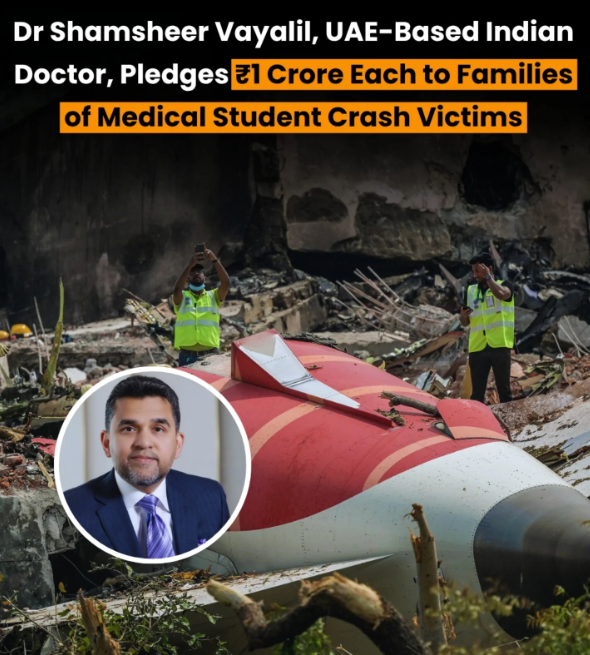– Mohammed Talha Siddi Bapa
It was lunchtime at the hostel of B.J. Medical College in Ahmedabad. Students chatted between bites. Gossip floated across the room. Some were preparing for their afternoon shifts; others lingered at the dining table, soaking in a rare break.
Then, without warning, the air split open.
A massive explosion – the crash of Air India Flight AI-171 – turned that moment of calm into carnage. The Dreamliner, bound for London, lost altitude moments after takeoff and collided with the hostel building. The death toll was staggering: 241 people on board and over 39 lives on the ground, including young doctors whose futures had just begun to unfold.
One Man’s Response, Without Waiting for a Call
Even before press briefings had settled or compensation packages were drafted, help arrived – not from government corridors or corporate boardrooms, but from the heart of a man shaped by humility.
Dr. Shamsheer Vayalil, a UAE-based Indian businessman originally from Kozhikode, Kerala, pledged ₹6 crore for the victims. A doctor by training and a healthcare entrepreneur by profession, Dr. Vayalil is no stranger to quiet generosity. He offered ₹1 crore to each of the four MBBS students’ families, and ₹20 lakh to each injured doctor and bereaved medical staff – all delivered through the BJMC Junior Doctors’ Association, without media fanfare or ceremony.
He didn’t ask for headlines. He didn’t even ask about the religion of the deceased. He just gave – because someone was in pain.
When Muslims Are Vilified, They Still Give
In India today, Muslims are too often portrayed as the “other.” From mob lynchings over cattle rumours, to homes bulldozed without trial, to Muslims denied apartments in urban cities – even in Gujarat, where government-allotted flats to Muslims triggered protests backed by Hindutva groups – this pattern repeats with chilling regularity.
And yet, amid this hostility, the Muslim community continues to serve – not in spite of the hate, but because their faith teaches them to rise above it.
Whether it’s Azim Premji dedicating billions to education, or Muslim volunteers distributing food during COVID-19, or assisting at the Kumbh Mela, one truth holds: charity is not a side practice in Islam – it is its beating heart.
In this very case, while Air India and the Tata Group have announced financial aid, as is customary, these efforts will follow a drawn-out path of verification, documentation, and bureaucratic checks. But Dr. Shamsheer’s contribution was immediate, direct, and unconditional. No waiting. No paperwork. Just help – where and when it was needed.
A Faith That Teaches Giving, Even When Denied
The Prophet Muhammad ﷺ once said:
“The best of deeds before Allah are to pardon those who wrong you, to connect with those who cut you off, and to give to those who deny you.”
Source: Al-Bukhari, Adab al-Mufrad, Hadith 76
This spirit was evident here. While some deny Muslims their rightful place in society, Muslims continue to give – not out of weakness, but out of spiritual strength.
A Question to Reflect On
In times of tragedy, when lives are lost and communities are broken, who arrives with compassion in their hands?
In a country that calls itself secular and plural, what does it say when the most heartfelt aid comes not from institutions or corporations, but from a member of a community too often maligned?
Perhaps it’s time to revisit the question:
Who are India’s Muslims, really – and what do they offer to the soul of this nation?




